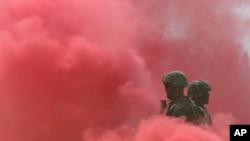In less than two months, Donald Trump will be sworn in as president of the United States, and yet he remains tight-lipped about his plans for nuclear-armed North Korea, which many believe is one of the most important security threats currently facing the United States.
While his murky North Korean policy is leaving South Korea particularly on edge, the political novice's “America First” foreign policy proposed during his campaign is casting a shadow over military alliances and agreements between Washington and Seoul. Among the deals are how to share the financial burden of keeping American troops in the South, deployment of Terminal High Altitude Area Defense, an advanced U.S. anti-missile defense system in South Korea and the restitution of wartime operational control of South Korean forces, which has been under the U.S. Command in South Korea since the 1950-53 Korean War.
Despite the uncertainty surrounding the alliance between Washington and Seoul following Trump’s victory, former U.S. ambassadors said the longstanding U.S.-South Korea alliance will largely remain intact and smooth sailing is expected for bilateral efforts to counter growing threats posed by North Korea.
“The U.S.-ROK alliance is very firm and very resilient,” said Thomas Hubbard, former ambassador to South Korea who served from 2001 to 2004. “Our common interest will prevail regardless of who is the president of the United States.”
Strong alliance
Christopher Hill, who was the U.S. ambassador to South Korea during the George W. Bush administration, said the Trump administration will likely maintain strong military ties with Seoul given Pyongyang’s steady march toward acquiring an operational nuclear weapon.
“I don’t think they are looking to have problems in the ROK relationship,” said Hill. “If any issue emerges, I think they’ll try to work it out with the ROK and I think some of the traditional Republican security outlook toward ROK will prevail – that is, I think, they’ll try to preserve the good relationship above all else.”
On the campaign trail, the president-elect lamented that U.S. allies are not bearing their fair share of alliance burdens and urged South Korea and Japan to “pay more” for U.S. soldiers stationed on their soil.
Asked whether the issue of burden-sharing could become a point of contention between the two allies, Alexander Vershbow, who spent two years in South Korea as the U.S. ambassador, said he anticipates some friction over the cost of defense, but not significant enough to bring about a fundamental shift in the long-standing partnership.
Some envoys disagreed with the notion that Seoul is not contributing enough for the stationing of U.S. forces. Hill said it “will be cleared once Trump understands and when he is properly briefed about the degree to which the ROK has been providing for its own defense.”
Hubbard concurred: “I think it reflects a misunderstanding of the degree to which the ROK is already bearing its share of the burden promoting regional security and deterrence vis-à-vis North Korea.”
North Korean threat
Currently, about 28,000 U.S. troops are based in South Korea, conducting joint military drills to counter increasing threats - real and perceived - emanating from the North. This year alone, the isolated regime has conducted two nuclear tests and launched more than 20 ballistic missiles.
Vershbow, who also served as NATO's deputy secretary general, suggested Trump and his national security team ratchet up direct pressure on the North Korean government through additional sanctions to bring it back to the negotiating table.
“I think they should never completely rule out options involving direct application of force,” Vershbow said. “And it is important to make clear that their continued intransigence will have consequences.”
Hill, who led the U.S. delegation for the now-stalled Six Party Talks on North Korea’s nuclear program between 2005 and 2009, stressed the role of China.
“If there’s any solution to North Korea, it will involve China,” said the former envoy.
Three weeks into his presidential transition, Trump and his transition team are scrambling to appoint all his cabinet members, a task that needs be completed before his inauguration in mid-January. As his confirmed and likely picks are mostly hardliners, an increasing number of experts say his administration is shaping up to be the one that will likely take a much tougher stance in foreign policy.
This report was produced in collaboration with VOA Korean Service.








